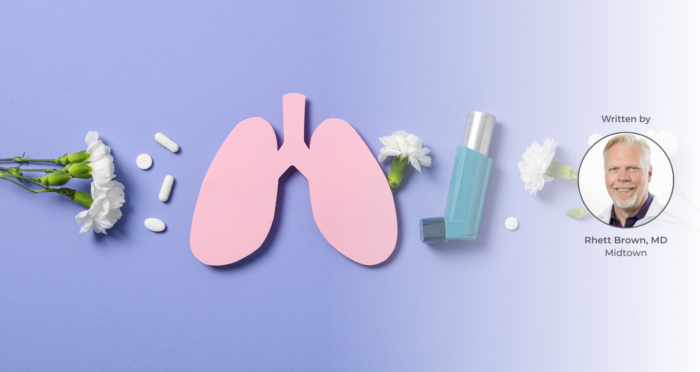Spring is here, bringing blooming flowers, warmer weather—and for millions of people, relentless sneezing, itchy eyes, and congestion. While most people consider seasonal allergies a temporary nuisance, research shows that allergies can contribute to chronic disease and have far-reaching effects on overall health. If you suffer from spring allergies, you might be at a greater risk for asthma, cardiovascular disease, sleep disorders, and even cognitive decline.
The Allergy-Chronic Disease Connection
Often, people do not realize that seasonal allergies are more than just an immune system overreaction to pollen. The inflammation triggered by allergies can contribute to or worsen chronic diseases.
1. Allergies and Asthma: A Dangerous Combination
One of the most well-known connections is between allergies and asthma. Allergic asthma is triggered by allergens like pollen, dust mites, and mold. If left unmanaged, allergies can inflame the airways and make breathing more difficult, leading to:
- More frequent asthma attacks
- Increased dependence on rescue inhalers
- Higher risk of hospitalization due to severe symptoms/complications
According to the CDC, nearly 60% of asthma cases in the U.S. are linked to allergies. If you have both conditions, managing your allergies is crucial for managing asthma.
2. Allergies and Sleep Disorders
If you feel exhausted during allergy season, you are not alone. Congestion, cough and throat irritation/postnasal drip from allergies can severely impact sleep quality. Poor sleep has been linked to:
- Increased risk of obesity, diabetes, and high blood pressure
- Daytime fatigue and reduced cognitive function
- Greater susceptibility to anxiety and depression
Could Allergies Be Affecting Your Brain?
Emerging research suggests that allergies may even impact brain health. Chronic inflammation in the body has been associated with cognitive decline and memory problems. Studies have shown people with long-term allergies may experience:
- Brain fog and difficulty concentrating
- Higher risk of developing neurodegenerative diseases like Alzheimer’s
- By managing your allergies effectively, you may also be protecting your brain health.
What You Can Do: Managing Allergies to Protect Long-Term Health
The good news? You do not have to suffer through allergy season without relief. Here are some science-backed strategies to manage allergies and reduce their impact on chronic health conditions:
1. Consider Allergy Immunotherapy
If over-the-counter antihistamines and nasal sprays are not enough, allergy immunotherapy (allergy shots or tablets) can help desensitize your immune system to allergens. This treatment can provide long-term relief and reduce the severity of your allergies over time.
2. Improve Indoor Air Quality
Reducing your exposure to allergens inside your home can make a significant difference. Try these tips:
- Use a HEPA air purifier in your bedroom.
- Wash bedding and curtains in hot water weekly to remove allergens.
- Keep windows closed during high pollen days and use air conditioning instead.
3. Prioritize Sleep Hygiene
Since allergies can disrupt sleep, improving sleep hygiene is essential:
- Close windows at night to minimize environmental allergens.
- Elevate your head with extra pillows to reduce congestion.
- Take an evening shower to rinse off pollen before bed.
- Consider using saline nasal spray or a neti-pot before bed.
4. Stay on Top of Preventive Care
Talk to your primary care provider about allergy management, especially if you have asthma, heart disease, or sleep issues.
Preventive care visits can help catch potential complications early and provide personalized treatment options.
Spring allergies are more than just an inconvenience—they can have long-term effects on your health, from worsening asthma. By taking proactive steps to manage your allergies, you can protect not only your daily comfort but also your long-term well-being.
If you’re struggling with seasonal allergies, don’t wait for symptoms to get worse. Schedule an appointment with your primary care provider today!




